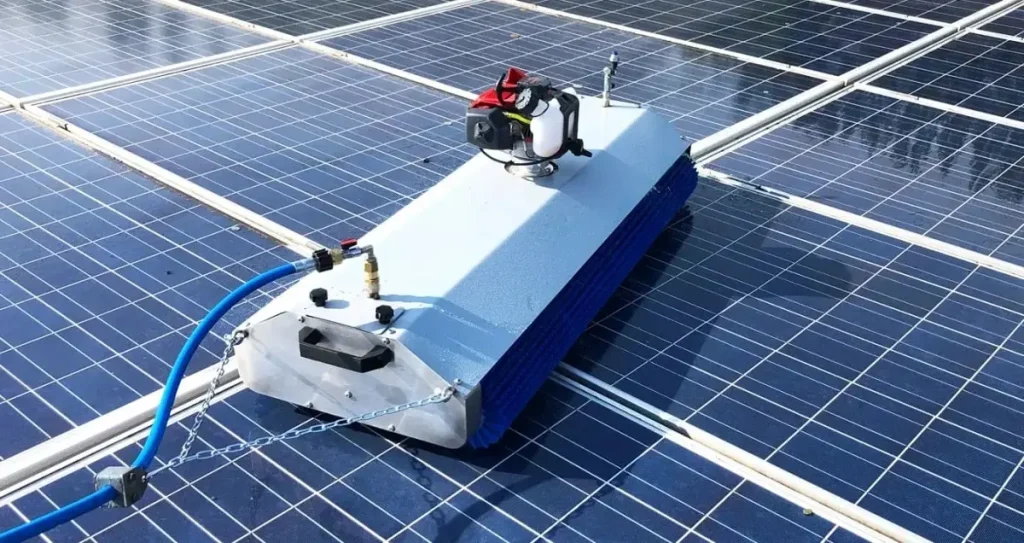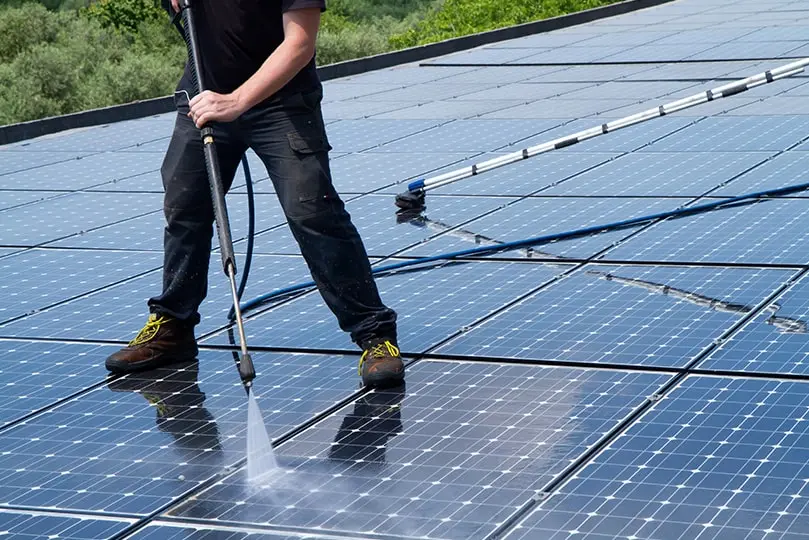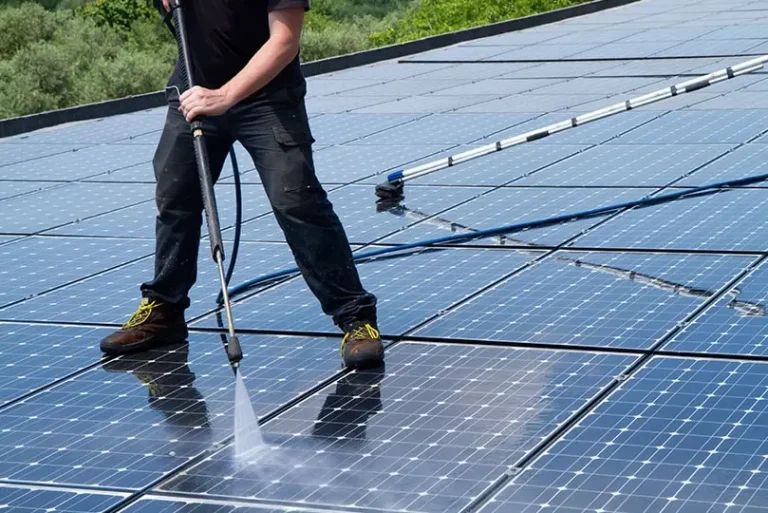With the rising popularity of solar energy, many homeowners and businesses are investing in solar panels to reduce their energy costs and environmental footprint. However, a common question that arises is whether solar panel cleaning is worth the time, effort, and expense. In this article, we’ll explore the importance of keeping solar panels clean and whether it justifies the cost.
The Importance of Clean Solar Panels
Solar panels work by converting sunlight into electricity. Dust, dirt, bird droppings, and other debris can accumulate on the surface of the panels, blocking sunlight and reducing their efficiency. Here’s why keeping your solar panels clean is crucial:

- Maximized Efficiency: Dirty panels can lose up to 20-25% of their efficiency. Regular cleaning ensures that the panels receive maximum sunlight, thereby optimizing their performance.
- Extended Lifespan: Clean panels are less likely to suffer from long-term damage caused by dirt buildup. Regular maintenance can extend the life of your solar investment.
- Aesthetic Appeal: Clean panels improve the overall appearance of your property. For businesses, this can be particularly important as it reflects a commitment to sustainability and cleanliness.
Factors to Consider
When deciding if solar panel cleaning is worth it, consider the following factors:
- Location: If you live in an area with high dust, pollution, or pollen levels, your panels are likely to get dirty faster. Coastal regions may also experience salt buildup, necessitating more frequent cleaning.
- Climate: In areas with frequent rain, natural cleaning might occur more often, reducing the need for manual cleaning. However, in dry regions, dirt can accumulate quickly.
- Installation Angle: Panels installed at steeper angles tend to stay cleaner as rainwater can wash away dirt more effectively. Flat panels might require more frequent cleaning.
- Cost of Cleaning: Hiring professionals can be costly, but it ensures thorough cleaning without the risk of damaging the panels. DIY cleaning is cheaper but requires the right equipment and knowledge to avoid damage.
- Crane Electrical Systems: Safe, Intelligent, and Efficient Operation
- Electrical Installation Guide: Wiring, Protection & Safety Standards
Cost-Benefit Analysis
To determine if solar cleaning is worth it, consider the cost versus the potential savings in energy efficiency. For example, if your panels lose 20% efficiency due to dirt and you save $100 per month on your electricity bill, that’s a loss of $20 per month. If professional cleaning costs $200 and is needed twice a year, the annual cost is $400. The annual loss in efficiency, however, is $240 ($20/month x 12 months), making cleaning a worthwhile investment.
Solar Panel Cleaning Solutions
Many homeowners and businesses are hesitant to invest in professional cleaning services due to cost concerns. However, affordable cleaning solutions are available, and the cost is often offset by increased energy savings. Professional solar cleaning services use specialized equipment and techniques to clean solar panels without causing damage. They also have the expertise to identify potential issues that might need attention, such as micro-cracks or loose wiring.

The Role of Professional Services
Professional services play a crucial role in maintaining and enhancing the performance of solar panels. From regular cleaning to inspections and replacements, professional technicians have the expertise and equipment necessary to keep your solar system operating at peak efficiency. They can provide tailored maintenance schedules based on your specific needs and local environmental conditions, ensuring that your solar panels receive the care they need.
Additionally, professional services can help you navigate the complexities of solar panel warranties and financing options. They can provide valuable advice on the best replacement panels and components for your system, ensuring compatibility and optimal performance.
DIY Cleaning Tips
If you decide to clean your solar panels yourself, follow these tips to avoid damage:
- Use Soft Brushes: Hard brushes can scratch the surface of the panels.
- Avoid Harsh Chemicals: Use mild soap and water. Harsh chemicals can damage the protective coating.
- Clean on a Cool, Overcast Day: Cleaning when the panels are hot can cause water to evaporate quickly, leaving streaks.
- Safety First: If your panels are on the roof, ensure you use proper safety equipment to avoid accidents.
The Need for Solar Panel Replacement
While solar panels are designed to be durable and long-lasting, they are not immune to wear and tear. Most solar panels have a lifespan of 25-30 years, but their efficiency gradually decreases over time. In some cases, individual panels or components may fail prematurely due to manufacturing defects, environmental factors, or damage from extreme weather conditions.
Regular inspections by professional solar technicians can help identify panels or components that need replacement. Timely replacement is crucial because a single malfunctioning panel can significantly reduce the overall performance of the solar array. By replacing faulty panels promptly, you can maintain the efficiency of your solar system and continue to benefit from maximum energy production.
- Complete Guide to Electronics Engineering
- Traction Control Sensor TCS: Working and Common Fault Signs
Affordable Replacement Solutions
Many homeowners and businesses are concerned about the cost of replacing solar panels. However, the good news is that the cost of solar technology has decreased significantly over the past decade. This trend has made affordable solar panel replacement more accessible. Additionally, many solar providers offer warranties that cover the cost of replacement for a certain number of years, reducing out-of-pocket expenses for the owner.
Conclusion
Solar panel cleaning can significantly impact the efficiency and longevity of your solar energy system. While the necessity and frequency of cleaning depend on various factors, a regular cleaning schedule, whether professional or DIY, is generally worth the investment. Keeping your panels clean ensures you get the most out of your solar energy system, ultimately saving you money and contributing to a greener planet.
